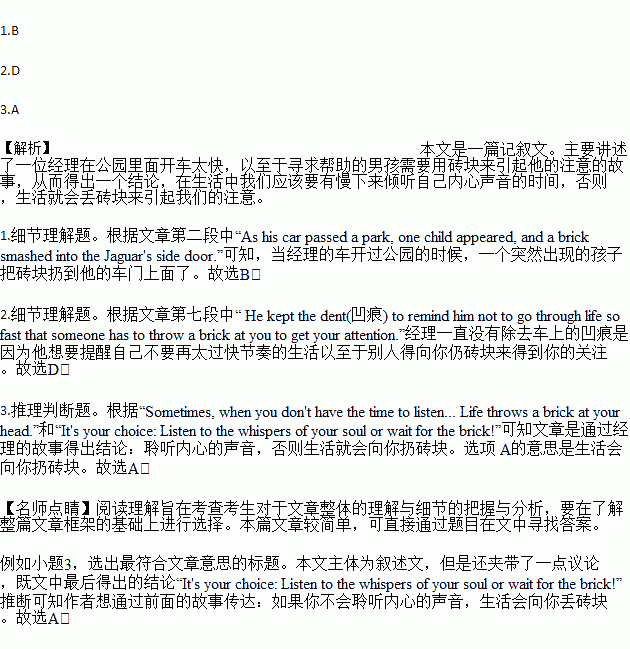题目内容
A young and successful manager was traveling down a neighborhood street, going a bit too fast in his new Jaguar.
As his car passed a park, one child appeared, and a brick smashed into the Jaguar's side door. He stopped the car very suddenly and drove the Jag back to the spot from where the brick had been thrown. He jumped out of the car, grabbed some kid and pushed him up against a parked car, shouting, "What was that all about and who are you? Just what on earth are you doing? That's a new car and that brick you threw is going to cost a lot of money. Why did you do it?"
"Please, sir, please, I'm sorry. I didn't know what else to do!" begged the youngster. "It's my brother," he said. "He fell out of his wheelchair and I can't lift him up."
Sobbing, the boy asked the executive, "Would you please help me get him back into his wheelchair? He's hurt and he's too heavy for me."
Moved beyond words, the driver tried to swallow the rapidly swelling lump(隆起的肿块)in his throat.He lifted the young mail back into the wheelchair and took out his handkerchief and wiped the scrapes(擦痕)and cuts, checking to see if everything was going to be okay.
"Thank you, sir. And God bless you, "the grateful child said to him. The man then watched the little boy push his brother to the sidewalk toward their home.
It was a long walk back to his Jaguar... a long, slow walk. He never did repair the side door. He kept the dent(凹痕) to remind him not to go through life so fast that someone has to throw a brick at you to get your attention.
Life whispers in your soul and speaks to your heart. Sometimes, when you don't have the time to listen... Life throws a brick at your head.
It's your choice: Listen to the whispers of your soul or wait for the brick!
1.What happened when the manager's car passed a park?
A. A boy ra n out to ask for help.
n out to ask for help.
B. A brick hit his car at the side door.
C. A boy's brother fell off his wheelchair.
D. A boy was playing with a brick by the roadside.
2.Why did the manager never repair the dent?
A. He forgot about it soon.
B. He couldn't afford to pay for the repairs.
C. He didn't care about his car as it was.
D. He wanted to keep it as a reminder.
3.Which of the following can be the best title for the text?
A. Life Throws a Brick at Your Head
B. Be Careful of the Brick on the Way.
C. A Misfortune Happened to a Manager
D. How a Boy Gave the Manager a Lesson
 阅读快车系列答案
阅读快车系列答案
